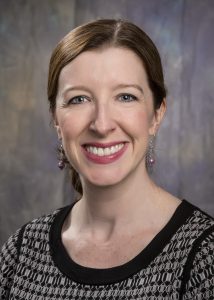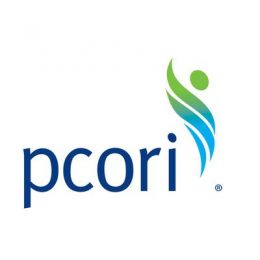
Katharine Conway, assistant professor of family medicine and director of medical education in the Department of Family Medicine at the Boonshoft School of Medicine.
A team of researchers led by the Wright State University Boonshoft School of Medicine Department of Family Medicine has been approved for a $15,000 award by the Patient-Centered Outcomes Research Institute (PCORI) to support a project focused on better understanding the health perspectives of Ohio’s refugee populations.
Katharine Conway, M.D., assistant professor of family medicine and director of medical education in the Department of Family Medicine at the Boonshoft School of Medicine, is the leader of the project, “Refugee Centered Medical Home — PCMH Working Better for Our Newest Neighbors.” Her team includes Michael Murphy at Catholic Social Services of the Miami Valley’s Refugee Resettlement Program in Dayton, Ohio; Michael Byun at Asian Services In Action Inc. (ASIA) in Cleveland; and Surendra Bir Adhikari, Ph.D., at the Ohio Department of Mental Health and Addiction Services in Columbus, Ohio.
Conway and her team will use the funds provided through PCORI’s Pipeline to Proposal Awards program to build a partnership of individuals and groups who share a desire to advance patient-centered outcomes research focused on the health of resettled refugees in Ohio.
Pipeline to Proposal Awards enable individuals and groups that are not typically involved in clinical research to develop the means to develop community-led funding proposals focused on patient-centered comparative effectiveness research. Established by the nonprofit PCORI, the program funds three tiers of awards that help individuals or groups build community partnerships, develop research capacity and hone a comparative effectiveness research question that could become the basis of a research funding proposal to submit to PCORI or other health research funders.
The United States has become a new home for many people seeking refuge from war, persecution, failed states and unremitting instability.
“Ohio has been at the forefront of welcoming newly arrived refugees and has consistently been in the top six states for numbers of refugee arrivals, welcoming 2,815 refugees from 30 countries in 2014,” Conway said. “The rapid increase in numbers of refugees resettled in Ohio has been due in large part to the diligent work of diverse Ohio agencies working together in effective partnerships.”
Within the past five years, Ohio has welcomed more than 13,000 refugees and has developed a set of resettlement best practices, innovative programs and an intentional focus on comprehensive coordination of care that has moved refugee resettlement beyond the basics of a checklist. Collaborative resettlement and integrated refugee health care exists in Ohio, but it is still in the beginning stages.
“Partners with skillsets from health care and medical education, community engagement and public health must act in unison to elevate the health status of this vulnerable population,” Conway said. “Most importantly, the voice of the refugee must be at the center of emerging strategies.”
 The project aims to better understand the health perspectives of Ohio’s refugee populations. So far the bulk of best practices for health care delivery has been determined by expert opinion, national guidelines and anecdotal experience. “To achieve full health potential, refugees need to guide our development and research further,” Conway said.
The project aims to better understand the health perspectives of Ohio’s refugee populations. So far the bulk of best practices for health care delivery has been determined by expert opinion, national guidelines and anecdotal experience. “To achieve full health potential, refugees need to guide our development and research further,” Conway said.
For more information about the project go to http://www.pcori.org/research-results/2016/refugee-centered-medical-home-pcmh-working-better-our-newest-neighbors-tier-i.
“The Pipeline to Proposal Awards program is a manifestation of PCORI’s commitment to the meaningful involvement of patients, caregivers, clinicians and other stakeholders in all our research endeavors,” said Jean Slutsky, PCORI’s chief engagement and dissemination officer. “It provides support to those who may not otherwise have an opportunity to contribute to the field of comparative effectiveness research. We’re pleased to follow the awardees’ progress as they develop partnerships and begin to form research questions.”
PCORI is an independent, nonprofit organization authorized by Congress in 2010 to fund comparative effectiveness research that will provide patients, their caregivers and clinicians with the evidence needed to make better-informed health and healthcare decisions. PCORI is committed to seeking input from a broad range of stakeholders to guide its work.
The Wright State University Boonshoft School of Medicine is a community-based medical school affiliated with seven major teaching hospitals in the Dayton area. The medical school educates the next generation of physicians by providing medical education for more than 444 medical students and 443 residents and fellows in 13 specialty areas and 10 subspecialties. Its research enterprise encompasses centers in the basic sciences, epidemiology, public health and community outreach programs. More than 1,500 of the medical school’s 3,229 alumni remain in medical practice in Ohio.

 Wright State’s Tom Hanks Center for Motion Pictures adds director, plans to grow
Wright State’s Tom Hanks Center for Motion Pictures adds director, plans to grow  Wright State departments create powerful collaboration researching threats to expectant mothers, babies
Wright State departments create powerful collaboration researching threats to expectant mothers, babies  Wright State nursing students to offer Stop the Bleed training in Wilmington
Wright State nursing students to offer Stop the Bleed training in Wilmington  Joyful connections
Joyful connections  Wright State’s MBA program ranked among the best for entrepreneurs by Princeton Review
Wright State’s MBA program ranked among the best for entrepreneurs by Princeton Review 